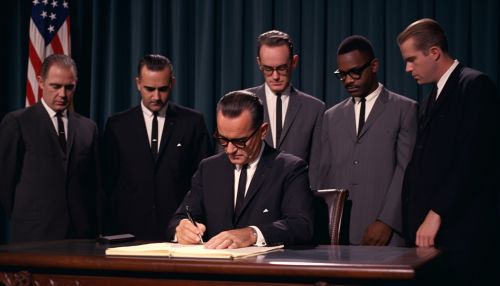Voting Rights Act of 1965
Background
The Voting Rights Act of 1965 (VRA) is a landmark piece of federal legislation in the United States that prohibits racial discrimination in voting. It was signed into law by President Lyndon B. Johnson during the height of the Civil Rights Movement, a period marked by significant protests and civil unrest over racial inequality and injustice.
Legislative History
The Voting Rights Act was introduced in Congress in March 1965, following the violent confrontation of peaceful protesters by law enforcement in Selma, Alabama, an event known as "Bloody Sunday". The event garnered national attention and galvanized public opinion on the issue of voting rights.
The Act was passed by the Senate on May 26, 1965, by a vote of 77-19. The House of Representatives passed the bill on July 9, 1965, by a vote of 333-85. President Johnson signed it into law on August 6, 1965.


Provisions
The Voting Rights Act of 1965 contains several key provisions designed to enforce the Fifteenth Amendment of the United States Constitution, which guarantees the right to vote regardless of "race, color, or previous condition of servitude."
Section 2 of the Act prohibits any voting practice or procedure that has a discriminatory effect. It is a permanent and nationwide provision.
Section 5, one of the Act's most controversial provisions, requires certain states and local governments with a history of discriminatory voting practices to obtain federal preclearance before implementing any changes to their voting laws or practices.
Section 4(b) contains the coverage formula that determines which jurisdictions are subject to preclearance based on their histories of discrimination in voting.
Impact and Legacy
The Voting Rights Act of 1965 had a significant impact on minority voting registration and turnout. It also led to a dramatic increase in the number of African American elected officials. However, the Act has also been the subject of controversy and legal challenges, particularly regarding the constitutionality of Section 5.
In 2013, the U.S. Supreme Court in Shelby County v. Holder ruled that Section 4(b) of the Act was unconstitutional, effectively gutting the preclearance requirements of Section 5. This decision has sparked ongoing debate about voting rights and discrimination in the U.S.
